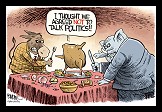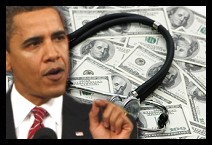Guest blogged by Ernest A. Canning
"The American people already believe that corporate special interests and their lobbyists run the show around here. I mean, the halls are crawling with them. But that’s not enough. Now the Court says to the big banks, to the drug companies, to the insurance companies, ‘Hey, all bets are off, and it’s open season. Our elections are for sale.’ A law won’t fix this; we have to fix it in the Constitution. So today I’ll introduce a constitutional amendment so that we, the people, can take back our elections and our democracy."
-- Rep. Donna Edwards (D-MD), on the floor of the U.S. House of Representatives, 1/28/10
In "Activist U.S. Supreme Court Makes It Official, We're Now 'The Corporate States of America'", Brad Friedman, along with so many others, expressed alarm over the Supreme Court's ruling in Citizens United v. Federal Election Commission [PDF], as well he should have.
Notwithstanding the sophistries offered by Jan Witold Baran, who neglected to mention in his Jan. 26, 2010 New York Times editorial that he is a former general counsel for the Republican National Committee, it is clear from the broad language applied by the five-member majority of the Supreme Court that Citizens United calls into question the validity of all laws which seek to prohibit or even limit the ability of corporate bought-and-paid-for candidates to flood the airwaves with the corporate message, either directly or through corporate-purchased propaganda time slots; an ability that can drown out the right of citizens to see and hear those who do not tow the corporate line.
As I will explain in this first of a series of articles, this ruling perverts the very reason why the framers included "freedom of the press" in the First Amendment to the Constitutional amendments.
Unfortunately, as I will also explain in this series, the ruling in Citizens United was not unexpected. To the contrary, it is but the latest salvo in a 40 year, billionaire-funded assault on the very foundations of our constitutional republic and the rule of law.
A belated effort to reclaim our basic heritage has emerged via a move to amend the Constitution to overcome the devastating impact of Citizens United. Harvard Law Professor Lawrence Lessig argues that a Constitutional Amendment to overturn Citizens United will not be enough; that we have to overcome what he describes as "the economy of influence" which now controls Congress. Lessig has called for a new Constitutional Convention. Another activist group, The Peace Team, has denounced the decision in Citizens United as an "act of treason." The Peace Team features an on-line petition calling for the impeachment of the five members of the Supreme Court who signed onto the majority opinion.
Regardless of where one stands on these efforts, a full appreciation of the big picture may be required before an effective movement can counter the well-funded and well organized assault on liberty...


 Sunday 'No Such Agreement' Toons
Sunday 'No Such Agreement' Toons How (and Why!) to 'Extend an Olive Branch' to MAGA Family Members Over the Holidays: 'BradCast' 11/21/24
How (and Why!) to 'Extend an Olive Branch' to MAGA Family Members Over the Holidays: 'BradCast' 11/21/24 'Green News Report' 11/21/24
'Green News Report' 11/21/24
 Former Federal Prosecutor: Trump Must Be Sentenced in NY Before Taking Office Again: 'BradCast' 11/20/24
Former Federal Prosecutor: Trump Must Be Sentenced in NY Before Taking Office Again: 'BradCast' 11/20/24 'Bullet Ballot' Claims, Other Arguments for Hand-Counting 2024 Battleground Votes: 'BradCast' 11/19/24
'Bullet Ballot' Claims, Other Arguments for Hand-Counting 2024 Battleground Votes: 'BradCast' 11/19/24 'Green News Report' 11/19/24
'Green News Report' 11/19/24 Trump Already Violating Law (He Signed!) During Transition: 'BradCast' 11/18/24
Trump Already Violating Law (He Signed!) During Transition: 'BradCast' 11/18/24 Sunday 'Into the Gaetz of Hell' Toons
Sunday 'Into the Gaetz of Hell' Toons Computer Security Experts Ask Harris to Seek Hand-Counts Due to Voting System Breaches: 'BradCast' 11/14/24
Computer Security Experts Ask Harris to Seek Hand-Counts Due to Voting System Breaches: 'BradCast' 11/14/24 'Green News Report' 11/14/24
'Green News Report' 11/14/24 Trump Criminal Cases Fade, as GOP 'Does Not Believe in Rule of Law': 'BradCast' 11/13/24
Trump Criminal Cases Fade, as GOP 'Does Not Believe in Rule of Law': 'BradCast' 11/13/24 Climate Advocates Brace for Fight With Trump 2.0: 'BradCast' 11/12/24
Climate Advocates Brace for Fight With Trump 2.0: 'BradCast' 11/12/24 Let It All Out: 'BradCast' 11/11/24
Let It All Out: 'BradCast' 11/11/24 Not All Bad: Abortion Rights Won Big (Almost) Everywhere: 'BradCast' 11/7/24
Not All Bad: Abortion Rights Won Big (Almost) Everywhere: 'BradCast' 11/7/24 U.S. CHOOSES CONVICTED CRIMINAL, ADJUDICATED RAPIST: 'BradCast' 11/6/24
U.S. CHOOSES CONVICTED CRIMINAL, ADJUDICATED RAPIST: 'BradCast' 11/6/24 ELECTION DAY 2024: Tea Leaves, Probs for Voters, What's Next: 'BradCast' 11/5/24
ELECTION DAY 2024: Tea Leaves, Probs for Voters, What's Next: 'BradCast' 11/5/24 'Closing Arguments' for Undecideds, Third-Party Voters: 'BradCast' 11/4/24
'Closing Arguments' for Undecideds, Third-Party Voters: 'BradCast' 11/4/24 The GOP 'Voter Fraud' Before the Storm: 'BradCast' 10/31/24
The GOP 'Voter Fraud' Before the Storm: 'BradCast' 10/31/24
 VA GOP VOTER REG FRAUDSTER OFF HOOK
VA GOP VOTER REG FRAUDSTER OFF HOOK Criminal GOP Voter Registration Fraud Probe Expanding in VA
Criminal GOP Voter Registration Fraud Probe Expanding in VA DOJ PROBE SOUGHT AFTER VA ARREST
DOJ PROBE SOUGHT AFTER VA ARREST Arrest in VA: GOP Voter Reg Scandal Widens
Arrest in VA: GOP Voter Reg Scandal Widens ALL TOGETHER: ROVE, SPROUL, KOCHS, RNC
ALL TOGETHER: ROVE, SPROUL, KOCHS, RNC LATimes: RNC's 'Fired' Sproul Working for Repubs in 'as Many as 30 States'
LATimes: RNC's 'Fired' Sproul Working for Repubs in 'as Many as 30 States' 'Fired' Sproul Group 'Cloned', Still Working for Republicans in At Least 10 States
'Fired' Sproul Group 'Cloned', Still Working for Republicans in At Least 10 States FINALLY: FOX ON GOP REG FRAUD SCANDAL
FINALLY: FOX ON GOP REG FRAUD SCANDAL COLORADO FOLLOWS FLORIDA WITH GOP CRIMINAL INVESTIGATION
COLORADO FOLLOWS FLORIDA WITH GOP CRIMINAL INVESTIGATION CRIMINAL PROBE LAUNCHED INTO GOP VOTER REGISTRATION FRAUD SCANDAL IN FL
CRIMINAL PROBE LAUNCHED INTO GOP VOTER REGISTRATION FRAUD SCANDAL IN FL Brad Breaks PA Photo ID & GOP Registration Fraud Scandal News on Hartmann TV
Brad Breaks PA Photo ID & GOP Registration Fraud Scandal News on Hartmann TV  CAUGHT ON TAPE: COORDINATED NATIONWIDE GOP VOTER REG SCAM
CAUGHT ON TAPE: COORDINATED NATIONWIDE GOP VOTER REG SCAM CRIMINAL ELECTION FRAUD COMPLAINT FILED AGAINST GOP 'FRAUD' FIRM
CRIMINAL ELECTION FRAUD COMPLAINT FILED AGAINST GOP 'FRAUD' FIRM RICK SCOTT GETS ROLLED IN GOP REGISTRATION FRAUD SCANDAL
RICK SCOTT GETS ROLLED IN GOP REGISTRATION FRAUD SCANDAL VIDEO: Brad Breaks GOP Reg Fraud Scandal on Hartmann TV
VIDEO: Brad Breaks GOP Reg Fraud Scandal on Hartmann TV RNC FIRES NATIONAL VOTER REGISTRATION FIRM FOR FRAUD
RNC FIRES NATIONAL VOTER REGISTRATION FIRM FOR FRAUD EXCLUSIVE: Intvw w/ FL Official Who First Discovered GOP Reg Fraud
EXCLUSIVE: Intvw w/ FL Official Who First Discovered GOP Reg Fraud GOP REGISTRATION FRAUD FOUND IN FL
GOP REGISTRATION FRAUD FOUND IN FL



















 Following the recent
Following the recent 


 Matt Drudge's poodle, anti-ACORN propagandist, GOP operative, and deranged wingnut Internet
Matt Drudge's poodle, anti-ACORN propagandist, GOP operative, and deranged wingnut Internet 
 Please see below for
Please see below for  MSNBC's Rachel Maddow continued her series last night, on the "purely political smear campaign" which ACORN has faced since registering nearly 2 million legal voters over the last decade. In the third installment of her continuing series, she focused on the ACORN smears over non-existent "voter fraud," which were at the heart of the U.S. Attorney scandal.
MSNBC's Rachel Maddow continued her series last night, on the "purely political smear campaign" which ACORN has faced since registering nearly 2 million legal voters over the last decade. In the third installment of her continuing series, she focused on the ACORN smears over non-existent "voter fraud," which were at the heart of the U.S. Attorney scandal. Following on
Following on  I was delighted (an understatement) to see Rachel Maddow on Thursday night jump into coverage of ACORN --- finally --- by highlighting so much of what we've been reporting here, sometimes completely alone, for years!
I was delighted (an understatement) to see Rachel Maddow on Thursday night jump into coverage of ACORN --- finally --- by highlighting so much of what we've been reporting here, sometimes completely alone, for years! Last week, in his
Last week, in his 













